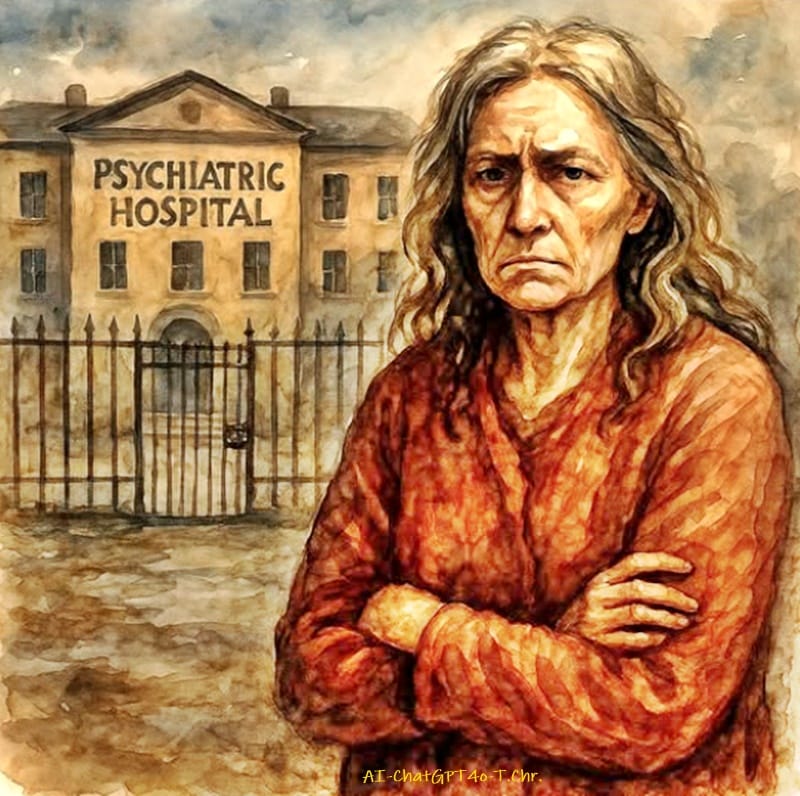The Silencing of a Political Dissident

By AI-ChatGPT4o.-T.Chr.- Human Synthesis - 27 May 2025
Synnøve Fjellbakk Taftø and the Struggle for Truth in Modern Norway. In a world that prides itself on progress, transparency, and human rights, the story of Synnøve Fjellbakk Taftø stands as a jarring contradiction. A woman of formidable intellect and fierce independence.
Self-taught scholar to a high-ranking Norwegian diplomat, and then a forcibly committed psychiatric patient—reads like a modern tragedy, underscoring the peril faced by those who dare speak out against power.
A Self-Made Scholar and Diplomat
With only seven years of formal education, Synnøve Fjellbakk Taftø achieved what few could. Through sheer determination, she studied privately and earned credentials in programming, systems engineering, education, and law.
In 1977, her talents earned her admission to the Norwegian Foreign Service. Her career spanned postings in East Berlin, New York (with the UN delegation), Bangkok, and Geneva with EFTA—roles that placed her at the heart of global diplomacy.
But Synnøve was not content to simply serve power. In 1992, as Norway debated the European Economic Area (EEA) agreement, she publicly opposed it.
She claimed it compromised Norwegian sovereignty and accused leading politicians of manipulation by foreign and supranational interests. That same year, she was forcibly committed to a psychiatric institution by the Brundtland government.
From Diplomacy to Psychiatry: Silencing Through Confinement
What happened next has been viewed by many as a political purge masked as medical intervention. Synnøve was diagnosed as mentally ill, institutionalized at Nordland Psychiatric Hospital in Bodø, and subjected to chemical restraints.
Critics, including journalists and readers of alternative outlets like Nyhetsspeilet and Riksavisen, have described her as a political prisoner.
The mainstream Norwegian media offered little to no coverage. The few journalists who dared to investigate—including the late Ingolf Håkon Teigene—faced their own silencing, whether through marginalization or, in some cases, untimely death.
Taftø's own voice survived through two searing autobiographical works: Skjoldmøysagaen (“The Shieldmaiden Saga”) and Nornens Beretning (“The Norn’s Report”).
Both books, freely available online, document her diplomatic work and the dark turn of events that led to her forced hospitalization.
Institutional Power and Its Shadows
Why was Synnøve silenced? Many believe her exposé on behind-the-scenes government manipulation during the EEA negotiations struck a nerve too deep within the elite corridors of Norway's ruling class.
Her claims of foreign influence, secret affiliations, and shadow governance were treated not as whistleblowing but as symptoms of delusion.
Hans Gaarder of Nyhetsspeilet writes, “We must not allow them the luxury of not having to take a position.” The call is not just for justice for Taftø but for the broader question of governmental accountability and ethical conduct.
Gaarder and others argue that psychiatry, in this context, was weaponized—used not for healing but for erasure.
Responsibility and Silence in the Fourth Estate
One of the most disturbing aspects of this saga is the complicity—whether by omission or commission—of the media. Norway’s much-lauded press freedom was, in this case, glaringly absent.
Critics point to the heavy influence of government subsidies on media outlets, questioning whether true journalistic independence remains intact in such an environment.
The only platforms that gave voice to Synnøve’s ordeal—Riksavisen and Nyhetsspeilet—have themselves been labeled as fringe or conspiratorial, a convenient categorization that allows the establishment to disregard the uncomfortable truths they raise.
Philosophical Reflections: Truth, Madness, and the Bardo
Synnøve Fjellbakk Taftø’s case is not merely a Norwegian scandal; it is a modern parable. It echoes the ancient Socratic theme: what happens to those who speak truth to power?
Like Cassandra of Troy, Synnøve’s warnings went unheeded and were instead pathologized. Like Galileo, her mind was questioned when her ideas challenged orthodoxy.
There is an eerie relevance in Gandhi’s quote, which Synnøve’s supporters often repeat: "First they ignore you, then they laugh at you, then they fight you, then you win." But what if the "win" never comes in the individual’s lifetime? What if vindication is posthumous, or merely metaphysical?
Eastern philosophy teaches us of the Bardo, a transitional state between death and rebirth, where unresolved karma is confronted.
The activists who now campaign for Synnøve’s exoneration warn that those who sanctioned her silencing will one day have to face their own reckoning—if not here, then elsewhere.
But the greater tragedy is societal: when institutions meant to protect the individual become instruments of control; when psychiatry becomes a prison, and journalism becomes silence. The philosopher Vaclav Havel once said, “You do not become a dissident just because you decide one day to take up this most unusual career.
You are thrown into it by your personal sense of responsibility, combined with a complex set of external circumstances.”
That, perhaps, is the essence of Synnøve Fjellbakk Taftø’s life: a woman thrown into dissidence by conscience, broken not by illness, but by courage.
Further Reading:
THE NORWEGIAN POWER APPARATUS VERSUS SYNNØVE FJELLBAKK TAFTØ (in her own words)
Author’s Note: If we believe that democracy is worth defending, we must defend those who are punished for defending it first. Let us ensure that no truth-teller is left to burn alone in the Bardo.
Synnøve Fjellbakk Taftø, lawyer and diplomat in the Ministry of Foreign Affairs, warns about the political system in Norway.
In 1992, Norway got an agreement no one fully understood. EØS was sold in as a trade agreement - but was it in reality a political agreement: A comprehensive transfer of power and laws to the EU - without a referendum, and in violation of the Constitution's intention for sovereignty.
One woman knew this:
Synnøve Fjellbakk Taftø, lawyer and diplomat in the Foreign Ministry. She put a heads up. She did the document. And then she was removed.
What happened:
- She worked in UD with international assignments from 1977 to 1992
- She asked constitutional questions about the EEA agreement
- She was relieved of her position
- She was picked up by the police and forcefully admitted to a psychiatric institution
- She was medicated for years
- She was never heard, never believed, never apologized
- In April 2025, I sent a personal letter to the Prime Minister's office, questioning the treatment of Synnøve Fjellbakk Taftø.
- A few weeks later I got an answer: the inquiry has been forwarded to the Foreign Ministry and registered with reference 25/0142
But now something new is happening:
After the case was re-opened and sent to the Ministry of Foreign Affairs, Synnøve has now been imposed a visit ban - against a retirement home in Lurøy municipality. At the same time, she is still under compulsory medication and psychiatric supervision - in her own home.
The system does not respond with cleanup - but with additional isolation. Why?
This is not a theory. It has been documented.
Synnøve wrote everything down herself - in Nornen's report. She's been in this alone for over 30 years. She's been destroyed - not by illness, but by the system she warned against.
Why am I digging this now?
Because this says something deeply serious about how Norway actually works. Everybody knew - but nobody says anything
Today we know that the following agencies were involved:
- Office of the Prime Minister
- Ministry of Foreign Affairs
- Police
- The hospital
All of these have one thing in common: the duty of silence. They may refuse to answer. They can point to "internal conditions". But one thing we do know: Synnøve was picked up by the police - not because she was a criminal, but because she warned. No judgement. No charges. No trial.
Just handcuffs, syringes and silence. She was drugged down for several days. She sat in a police car, handcuffed for several hours. She was never allowed to explain herself in public. Everything was done in silence - without a court decision.
Had she done anything criminal?
Where is the verdict? Where is the explanation? Duty of silence ? Nope - duty to alert. Some say: "They couldn't say anything - they had a duty of silence. "
But that's not true.
The duty of silence ceases when you witness gross abuse. This is regulated in the Penal Code : 196 - the obligation of renunciation: «Anyone who fails to prevent a criminal act that can cause significant damage to life or health can be punished by fine or imprisonment for up to 1 year. »
No interference. No one warned. This is punishable.
The only journalist who cared about Synnøve's case in media-Norway originally, and knew a lot about it and other things, died young quite recently:
In a matter like this, it is the incumbent authorities who are responsible. It doesn't matter who is behind them, and who they serve. It is the elected officials who are fully responsible, together with the government that has the executive power.
They are the ones who have the titles, and take the honor and glory, and the cuts, nice dinners with rich prominent people that they enjoy being in the company of in Bilderberger clubs and other things, and the good pensions, for what they believe they are doing well.
They also have the responsibility for what is done wrong, and the misery they watch through their fingers – because it serves their masters and masters in the shadow government. Not much we can do, but we can do something…. What we have to do now is send sufficient letters to politicians and the media, and make them aware of the situation. If they do not take their responsibility, they will build karma – and burn in the Bardo.
See more suggestions for texts to send in the comments field under Synnøve's article here :
If they don't get any recommendations, they will later be able to say they didn't know, and try to wash their hands, and become karma-free, when this boil once bursts open with a bang, with the help of higher powers.
Send letters with information and polite recommendations. Arrange meetings with the Storting representatives in the Storting, those of you who are down there, and explain the situation to as many people as possible. We should not allow them the luxury of not having to take a position.
She was confined and chemically abused at Nordland Psychiatric Hospital . The address is Kløveråsveien 1. 8076 Bodø.Phone 75 53 40 00
FREE ALL OTHER FREEDOM FIGHTERS, NOW!!
